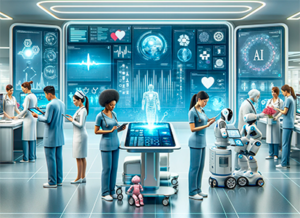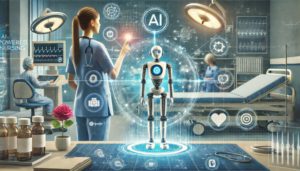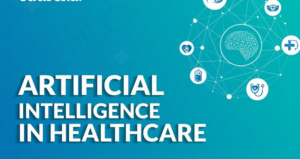 Artificial Intelligence (AI) is making a huge impact in healthcare, especially within nursing. As digital health technologies evolve, AI is reshaping patient care, improving workflow efficiency, and enhancing nursing education.
Artificial Intelligence (AI) is making a huge impact in healthcare, especially within nursing. As digital health technologies evolve, AI is reshaping patient care, improving workflow efficiency, and enhancing nursing education.
AI in nursing is not replacing nurses but rather supporting them by enabling smarter, data-driven decisions, more personalized care, and more effective time management.
From advanced AI-powered tools for nurses to AI-driven predictive analytics, this technology is enhancing patient outcomes and boosting professional development in nursing.
In this article, we’ll explore how AI is transforming the nursing profession, improving patient care, and addressing critical healthcare challenges.
The Growth of AI in Healthcare Technology
The healthcare industry is experiencing rapid digital transformation, with AI at the center of this shift. Technologies such as electronic health records (EHRs), wearable devices, and telemedicine are changing how care is provided. Nurses, as key healthcare providers, are seeing these innovations in action. AI tools are helping nurses with tasks like patient monitoring, medication management, and predictive analytics to prevent health issues early. These advancements make nursing practices more efficient, allowing nurses to spend more time on direct patient care and complex decision-making. Adapting to these technologies is crucial for nurses to stay at the forefront of healthcare in this digital era.

Struggling to meet your deadline?
Get your assignment on Artificial intelligence in nursing: Role of AI in Nursing done by certified MDs and PhDs in the USA. ORDER NOW!
AI Applications in Patient Care
AI in nursing is enhancing patient care in multiple ways, improving the quality and efficiency of nursing practices. For example, AI-powered systems are now used for early detection of patient deterioration by analyzing vital signs and other critical data, alerting nurses before serious complications arise. Virtual nursing assistants powered by AI provide continuous support for both patients and nurses, offering guidance on medication adherence and answering common health questions. AI tools also assist nurses in wound care by offering advanced imaging technologies to better track healing progress. Furthermore, AI is helping to develop personalized treatment plans by analyzing a patient’s data, including their medical history, genetics, and lifestyle. This not only improves patient outcomes but also allows nurses to focus on delivering empathetic care. As AI continues to develop, nurses will play a pivotal role in integrating these tools into their practice, complementing their care with innovative AI-driven solutions.
The Expanding Role of AI in Nursing Practice
AI’s role in nursing practice is growing rapidly, reshaping how nurses perform their duties. AI is streamlining administrative work, enhancing clinical decision-making, and improving overall nursing workflows. For instance, AI-powered scheduling systems optimize nurse staffing, ensuring adequate coverage, reducing burnout, and increasing job satisfaction. AI-based voice recognition technology is also simplifying documentation, allowing nurses to spend more time with patients. Predictive analytics tools help nurses identify patients at high risk of complications, allowing for early interventions. Virtual nursing assistants provide real-time decision support, alerting nurses to potential drug interactions and helping them manage complex patient needs. As AI tools continue to evolve, they enhance nurses’ ability to deliver more personalized, data-driven care, ultimately leading to better patient outcomes.
Enhancing Patient Care with AI
AI is reshaping patient care by offering nurses powerful AI tools to improve the quality of care they provide. AI-driven systems help nurses continuously monitor patient health by analyzing real-time data and detecting subtle changes that may indicate deterioration. AI-powered predictive analytics also assist in identifying high-risk patients, enabling proactive care and reducing complications. Virtual nursing assistants offer evidence-based recommendations and provide support, freeing nurses to focus on critical aspects of patient care. Additionally, AI-enhanced imaging tools support more accurate diagnoses and treatment planning. These technologies are designed to enhance the human aspect of nursing care, not replace it. By embracing AI, nurses can improve patient outcomes and provide a higher level of personalized care in the digital age.
AI-Driven Personalized Treatment Plans
AI is revolutionizing the development of personalized treatment plans, allowing nurses to deliver more tailored care. AI tools analyze vast amounts of patient data, including genetic information, medical history, and lifestyle factors, to create individualized treatment strategies. For example, AI can recommend personalized medication dosages or dietary plans, taking into account a patient’s unique needs and potential drug interactions. This level of personalization not only enhances treatment effectiveness but also improves patient engagement and satisfaction. Nurses collaborate with AI to craft holistic care plans that address the patient’s physical, emotional, and social well-being, reinforcing the core principles of patient-centered care in modern healthcare.
AI for Early Detection and Prediction of Health Issues
AI is revolutionizing the early detection and prediction of health issues, providing nurses with critical tools to intervene before problems escalate. By leveraging machine learning algorithms, AI systems analyze patient data such as vital signs and behavior patterns to detect early warning signs of serious health conditions. For example, AI can predict the onset of sepsis or a heart attack before traditional diagnostic methods. These predictive capabilities allow nurses to act quickly, often preventing life-threatening complications. AI-based tools help prioritize care, ensuring that high-risk patients receive immediate attention. By using AI for early diagnosis, nurses can focus on delivering timely and life-saving interventions, while AI handles the heavy lifting of data analysis.
Continuous Patient Monitoring with AI
AI is transforming patient monitoring, allowing nurses to continuously track patient health with greater accuracy. Wearable devices and smart sensors now collect real-time data, enabling 24/7 monitoring of patient conditions without requiring constant physical checks. AI-powered systems can identify patterns in the data, alerting nurses to potential issues before they become critical. For example, AI can detect early signs of infection or predict a patient’s risk of falling. This constant monitoring improves patient safety and helps reduce nurse workload, freeing them up to focus on more complex care tasks. AI-enhanced patient monitoring leads to proactive care, better outcomes, and greater patient satisfaction in modern healthcare.
Streamlining Nursing Workflows with AI
AI is making nursing workflows more efficient, enabling nurses to spend more time focusing on patient care rather than administrative tasks. Automated scheduling systems improve nurse staffing, reducing burnout and ensuring appropriate work-life balance. AI-powered documentation tools simplify the process of recording patient information by converting spoken notes into structured electronic health records. AI-enhanced medication management systems help prevent medication errors and ensure timely administration. These AI-driven solutions boost productivity, improve patient safety, and help nurses provide high-quality care. As AI continues to evolve, it will become an indispensable tool in optimizing nursing workflows and ensuring better healthcare delivery.
AI in Automated Documentation and Record-Keeping
Automated documentation powered by AI is changing how nurses handle patient records, reducing time spent on paperwork. AI systems that use voice recognition and natural language processing are now capable of converting spoken notes into accurate patient records. These tools save nurses valuable time and improve the quality of documentation, reducing errors and improving the accuracy of patient information. AI can also analyze patient records, identifying trends and potential risks that may have gone unnoticed. By streamlining documentation, nurses can focus on direct patient care, improving the overall quality of care and patient outcomes.
AI in Administrative Tasks and Resource Allocation
AI is helping reduce the administrative burden on nurses, allowing them to focus on delivering patient care. AI-powered scheduling tools optimize nurse rosters based on patient needs, nurse skills, and shift preferences. Automated inventory management ensures that necessary supplies are always available, reducing stress and improving efficiency. Chatbots powered by AI handle routine patient inquiries and follow-ups, freeing nurses to concentrate on more complex tasks. AI also streamlines billing and insurance claims, simplifying administrative work. By automating administrative tasks, AI enables nurses to maximize their time and energy for patient care, improving job satisfaction and healthcare delivery.
Decision Support Systems for Nurses
AI-powered decision support systems are improving clinical decision-making in nursing, reducing errors, and enhancing patient care. These systems analyze vast amounts of patient data to offer evidence-based recommendations, helping nurses make better decisions in real-time. AI provides guidance on treatment options, medication dosages, and drug interactions, empowering nurses to act quickly and confidently. AI decision support tools also flag potential complications, allowing nurses to intervene early. These systems enhance nursing expertise and help nurses deliver high-quality care, improving patient outcomes and increasing job satisfaction in a tech-driven healthcare environment.
Improving Nursing Education with AI
AI is reshaping nursing education by providing personalized learning experiences for students. Virtual reality (VR) and AI-powered simulations offer immersive, hands-on training that allows students to practice procedures and decision-making in a safe, controlled environment. AI algorithms adapt these simulations in real-time, adjusting to each student’s progress and abilities. Personalized learning paths, driven by AI, help identify knowledge gaps and tailor study materials accordingly. AI-driven tools also provide instant feedback, allowing nursing students to track their progress and continuously improve. By incorporating AI into nursing education, we are preparing future nurses to thrive in a tech-driven healthcare landscape, ultimately improving patient care and outcomes.
AI-Powered Simulation and Virtual Reality in Nursing Education
AI-powered simulations and virtual reality (VR) training are transforming how nursing students learn and practice. These advanced technologies create realistic, lifelike scenarios where students can practice complex procedures and decision-making skills. AI adapts these simulations based on a student’s performance, allowing them to progress at their own pace. Virtual patients powered by AI respond naturally to interventions, helping students develop critical thinking, communication, and empathy. VR and AI-powered simulations allow repeated practice, giving students confidence before they enter clinical settings. By integrating AI into nursing curricula, educators are preparing a new generation of nurses who are both highly skilled and tech-savvy.
Personalized Learning Paths in Nursing Education
AI is revolutionizing nursing education by creating personalized learning paths that cater to individual student needs. These intelligent systems analyze performance data to identify strengths and areas for improvement, offering customized study plans. AI platforms adjust the difficulty and format of content in real-time, ensuring that students are continuously challenged but not overwhelmed. This personalized approach boosts student engagement, confidence, and retention of knowledge. By leveraging AI, nursing programs are equipping students with the skills needed to excel in the evolving healthcare environment, resulting in more competent and well-prepared nursing professionals.
AI in Nursing Education and Practice: Transforming Healthcare with Advanced Technology
 AI is transforming nursing practice, education, and patient care, empowering nurses to provide better, more personalized care. From AI tools that optimize workflows to AI-powered patient monitoring and decision support systems, these innovations are revolutionizing nursing, improving patient outcomes, and supporting nurses in their mission to deliver high-quality care. By embracing AI, the nursing profession is leading the way in the digital healthcare revolution.
AI is transforming nursing practice, education, and patient care, empowering nurses to provide better, more personalized care. From AI tools that optimize workflows to AI-powered patient monitoring and decision support systems, these innovations are revolutionizing nursing, improving patient outcomes, and supporting nurses in their mission to deliver high-quality care. By embracing AI, the nursing profession is leading the way in the digital healthcare revolution.
Continuous Assessment and Feedback with AI
AI is revolutionizing how nursing students are assessed, offering continuous and real-time feedback that improves learning outcomes. With AI-powered tools, educators can evaluate students on various activities, from written assignments to clinical simulations, providing instant, detailed feedback. Unlike traditional methods, AI systems can analyze patterns in student work, identifying strengths and pinpointing areas for improvement. This allows nursing students to quickly address knowledge gaps and improve their skills at an accelerated pace. As students advance, AI can adapt assessments to match their growing abilities, ensuring a more tailored learning experience. For educators, AI provides valuable insights into class performance, helping them adjust teaching strategies. By incorporating AI into nursing education, the process becomes more personalized, efficient, and aligned with the fast-changing healthcare environment, preparing students to become skilled and confident professionals.
AI-Powered Simulation and Training for Nurses
AI-powered simulations are transforming nursing education, offering immersive, risk-free environments where students can practice essential skills. These simulations replicate real-world medical scenarios, allowing students to develop their critical thinking and decision-making abilities without real-life consequences. AI algorithms adjust the difficulty of simulations based on individual performance, helping learners progress at their own pace. Virtual patients respond to interventions, providing real-time feedback and helping students build empathy and communication skills. This approach ensures that nurses are well-prepared before entering clinical settings. By incorporating AI into training, nursing programs are developing a new generation of tech-savvy professionals who are ready to excel in modern healthcare environments.
Personalized Learning with AI in Nursing
AI is enabling personalized learning experiences in nursing education by adapting to each student’s unique needs and learning pace. Smart AI systems track individual performance and adjust learning materials to address specific strengths and weaknesses. For example, if a student excels in one subject but struggles in another, the AI can suggest additional resources and practice exercises to improve in the weaker areas. This tailored approach boosts knowledge retention and enhances student engagement, helping them feel more confident in their learning journey. By embracing AI-driven personalized education, nursing programs are shaping more competent and well-rounded healthcare professionals. 
Virtual Mentoring and Skill Development in Nursing
AI is also enhancing virtual mentoring in nursing education, providing students with continuous access to guidance and hands-on practice. AI-powered virtual mentors adapt to each learner’s progress, offering real-time feedback and support. Augmented reality (AR) technologies enable students to practice complex nursing procedures in a controlled, risk-free environment. Virtual mentoring fosters peer-to-peer collaboration, connecting students globally for shared learning and problem-solving. This innovative approach eliminates geographical and time barriers, ensuring that every nursing student has access to high-quality skill development, regardless of location.
AI’s Impact on Nursing Practice and Patient Care
AI is improving real-world nursing practice by reducing workloads, enhancing patient care, and optimizing healthcare delivery. Nurses using AI-powered tools can focus more on direct patient care and complex decision-making, as routine tasks such as documentation and scheduling are automated. Predictive analytics powered by AI help healthcare providers make more accurate diagnoses, create personalized treatment plans, and offer timely interventions. AI is also improving healthcare efficiency and reducing costs, leading to better patient outcomes. For example, AI-driven early warning systems have helped reduce hospital-acquired infections and lower mortality rates in intensive care units. AI also plays a role in alleviating nursing shortages and preventing burnout, helping nurses manage their workloads and remain engaged in their roles.
Improved Patient Outcomes with AI in Nursing
AI has demonstrated significant benefits in improving patient outcomes by enabling earlier diagnoses and more personalized treatment plans. Using predictive analytics and real-time monitoring, AI helps nurses identify potential health issues before they become critical, allowing for quicker interventions. AI decision support systems assist in creating customized care plans, improving chronic disease management, and reducing medication errors. In critical care units, AI systems have successfully reduced mortality rates by detecting subtle changes in patient conditions. As AI tools continue to evolve, their integration with nursing expertise is leading to better overall patient care and improved long-term health outcomes.
Reducing Nurse Burnout and Fatigue with AI
Nurse burnout is a growing concern in healthcare, but AI is helping to alleviate this issue by automating repetitive tasks and streamlining workflows. AI tools can handle administrative duties such as documentation, freeing up nurses to focus on direct patient care. Smart AI algorithms optimize nurse schedules, ensuring appropriate nurse-to-patient ratios and reducing overwork. AI-powered virtual assistants can also assist with clinical decision-making, offering evidence-based recommendations and reducing cognitive load. As a result, nurses experience less stress and fatigue, improving job satisfaction and retention rates, while maintaining high standards of patient care.
Cost-Effective Healthcare Delivery with AI
AI is making healthcare delivery more affordable and efficient by streamlining processes and improving resource allocation. Predictive analytics help optimize staffing levels, reducing unnecessary overtime costs and ensuring that nurses are not overburdened. AI-powered diagnostic tools allow for quicker and more accurate diagnoses, which can help reduce the need for costly tests and treatments. Virtual nursing assistants provide 24/7 support to patients, decreasing the need for frequent in-person visits. Additionally, AI-driven preventive care strategies help identify at-risk patients early, preventing complications that could lead to expensive hospital readmissions. In this way, AI contributes to more cost-effective and patient-centered care.
Challenges and Considerations in AI Integration
Despite the many advantages of AI in nursing, there are challenges to consider, particularly regarding privacy, security, and ethics. The integration of AI systems in healthcare requires careful management of sensitive patient data. Privacy concerns must be addressed through robust data protection measures and secure data storage practices. There is also the risk of over-reliance on AI, which could diminish critical thinking skills among nursing professionals. Ethical questions arise when AI systems make decisions that conflict with human judgment, and concerns about algorithmic bias could impact patient outcomes. Furthermore, integrating AI into existing healthcare systems requires substantial investment in technology and training. Ensuring nurses are equipped to use AI tools effectively while maintaining the human touch in patient care is essential.
Ethical Implications of AI in Healthcare and Nursing
The use of AI in healthcare, especially in nursing, raises important ethical concerns. As AI plays a larger role in patient care, questions about accountability and decision-making arise. There is a need for clear guidelines on how to balance AI capabilities with human expertise and empathy. Data privacy is a critical issue, as AI requires vast amounts of patient data to function. Ensuring informed consent and patient autonomy in the AI-driven healthcare environment is crucial. Additionally, the risk of AI exacerbating healthcare disparities, if not implemented equitably, must be addressed. Nurses, as patient advocates, are at the forefront of ensuring that AI is used responsibly and ethically, always prioritizing patient well-being.
Data Privacy and Security in AI-Powered Healthcare
As AI becomes more integrated into nursing practice, data privacy and security are top priorities. AI systems handle large amounts of sensitive patient data, making it crucial to implement strong encryption and secure storage solutions. Nurses must be vigilant in safeguarding patient information and following cybersecurity best practices. Patients should also be informed about how their data is used and protected in AI-powered care. As the role of AI in healthcare continues to expand, maintaining data security is vital for ensuring trust and protecting patient confidentiality.
Integrating AI into Existing Healthcare Systems
The integration of AI into existing healthcare systems presents both opportunities and challenges. Many healthcare institutions still rely on legacy systems that may not be compatible with the latest AI technologies. Nurses are key to ensuring the smooth integration of AI tools into their daily workflows, requiring adequate training and support. Interoperability between AI systems and electronic health records (EHRs) is essential for seamless data exchange and improved decision-making. Despite the initial hurdles, successfully integrating AI can enhance workflow efficiency, reduce administrative burdens, and ultimately improve patient care. Nurses’ involvement in this process is essential to ensure that AI enhances the quality of care without disrupting the essential human elements of nursing.
AI’s Transformative Role in Nursing and Healthcare
AI in healthcare is not only enhancing the quality of care but is also improving nursing education, practice, and patient outcomes. From AI-driven decision support systems to virtual mentors and personalized learning experiences, AI tools are empowering nurses to deliver more accurate, timely, and compassionate care. While challenges remain, such as data privacy concerns and ethical dilemmas, the integration of AI into nursing practice promises a future where healthcare is more efficient, effective, and patient-centered. As AI continues to evolve, it will undoubtedly play a pivotal role in shaping the future of nursing and healthcare at large.
AI in Nursing: Transforming Modern Healthcare and Nursing Practice
The Future of AI in Nursing and Healthcare
The future of AI in nursing is set to revolutionize healthcare, transforming the way care is delivered, workflows are managed, and nurses interact with patients. As artificial intelligence applications in nursing become more sophisticated, we can expect AI-powered tools for nurses to improve patient outcomes, streamline processes, and enhance nursing practices in ways we’ve yet to fully grasp. For instance, predictive analytics in nursing will allow early identification of potential health risks, preventing crises before they occur. AI-driven healthcare solutions like virtual nursing assistants may evolve into advanced systems offering immersive, real-time support and patient education. AI in patient care will become more personalized, tailoring treatment plans to individual needs and genetic profiles, while wearable AI-enhanced patient monitoring will provide continuous updates, helping nurses address concerns quickly. These technological innovations will shift nurses’ roles toward more complex decision-making and emotional support, allowing AI to handle repetitive, administrative tasks. As the future unfolds, AI in nursing education will be essential to prepare nurses for these new roles, fostering a more efficient, patient-centered, and accessible healthcare system.
Emerging AI Technologies in Nursing
The rapid development of machine learning in nursing and other emerging AI technologies is poised to significantly impact both patient care and nursing workflows. AI-powered tools for nursing professionals are already making a difference with innovations such as real-time health monitoring through wearables, voice-activated AI tools for nursing documentation, and predictive analytics that offer early warnings about patient conditions. Natural language processing (NLP) is streamlining charting by enabling intuitive voice commands, freeing nurses from tedious data entry. Advanced AI-driven decision support systems in nursing are enhancing clinical decision-making by offering insights that guide patient care. Emotional AI, a technology still in development, could help nurses assess a patient’s emotional state and provide more compassionate care. As these technologies mature, they will augment nurses’ ability to deliver precise, efficient, and empathetic care.
The Evolving Role of Nurses in an AI-Driven Healthcare System
As AI in nursing practice becomes more integrated into healthcare, nurses are taking on more complex, impactful roles. Rather than replacing nurses, AI-driven healthcare solutions are empowering them to become AI interpreters, bridging the gap between algorithms and patient care. Nurses are learning how to analyze data generated by AI-based patient monitoring systems and using that information to make informed, personalized decisions. The AI in nursing education curriculum is evolving to equip nurses with AI literacy, enabling them to understand and apply these technologies effectively. Additionally, nurses are assuming roles as AI trainers, ensuring that these tools are properly adapted to real-world clinical scenarios. As AI handles more routine tasks, nurses will have more time to engage with patients, providing holistic care, education, and emotional support. This evolution allows nurses to practice at the top of their license, positioning them as leaders in healthcare innovation.
Preparing for the Future of AI in Nursing
The future of AI in nursing education requires a shift in how nurses are trained. Nursing schools are incorporating AI-powered training tools and digital health modules into their curricula, ensuring that future nurses are tech-savvy and well-prepared to work with AI in patient care and outcomes. Continuous professional development is equally important, with ongoing programs aimed at helping nurses stay updated on the latest AI in healthcare advancements. As AI tools become more widespread, nurses will need to develop critical thinking skills to interpret AI-generated insights, maintaining their ability to make ethical, compassionate decisions. By combining technological proficiency with strong emotional intelligence and communication skills, nurses will lead the way in shaping a healthcare system where AI in nursing workflow optimization enhances both patient outcomes and job satisfaction.
The Impact of AI on Nursing Practice and Job Satisfaction
The impact of AI on nursing practice is profound, with AI-driven decision support systems in nursing helping nurses make faster, more accurate decisions. By automating repetitive tasks such as documentation and scheduling, AI gives nurses more time to engage directly with patients. AI-powered clinical decision support is helping nurses provide more tailored and effective care, while AI-powered chatbots in nursing are streamlining patient communication and support. These innovations not only improve patient care but also reduce nursing stress, contributing to AI in nursing burnout reduction and AI for nursing job satisfaction. As AI becomes a more integral part of nursing practice, nurses will be able to focus on the aspects of their role that technology cannot replace—such as offering emotional support, education, and personalized care.
Balancing Technology and Human Touch in Nursing
While AI-enhanced medication management and machine learning for patient monitoring can optimize patient care, the human element remains at the core of nursing. Nurses must learn how to integrate AI-powered simulation in nursing education and AI-driven insights with their emotional intelligence and interpersonal skills. AI in nursing documentation can reduce administrative burdens, giving nurses more time to engage with patients, addressing their emotional and psychological needs. Nurses will need to strike a balance between utilizing AI tools for nursing professionals and maintaining the compassion that is essential to the nursing profession. By embracing technology while staying true to their caring nature, nurses can provide personalized treatment plans that combine the best of both worlds: efficient, data-driven care paired with empathy and understanding.
Conclusion
The future of AI in healthcare staffing and AI for nursing workload management promises a more efficient, effective healthcare system. As AI in nursing practice continues to evolve, it will help nurses provide more accurate, personalized care, reduce burnout, and streamline workflows. However, the heart of nursing will always lie in human compassion, and AI will only enhance this. By embracing AI-powered clinical decision support, AI-powered tools for nurses, and AI in nursing education, the nursing profession can continue to lead the way in improving patient outcomes and advancing healthcare as a whole. Nurses will remain indispensable as they integrate AI-driven healthcare solutions with their expertise, ensuring a bright, innovative future for patient care.
References

Dont wait until the last minute.
Provide your requirements and let our native nursing writers deliver your assignments ASAP.
- Castonguay, A., Farthing, P., Davies, S., Vogelsang, L., Kleib, M., Risling, T. L., & Green, N. (2023). Revolutionizing nursing education through AI integration: A reflection on the disruptive impact of ChatGPT. Nurse Education Today, 129, 105916. https://doi.org/10.1016/j.nedt.2023.105916
- Jen Gwo-Hwang, Tang, K.-Y., & Tu, Y. (2022). How artificial intelligence (AI) supports nursing education: Profiling the roles, applications, and trends of AI in nursing education research (1993–2020). Interactive Learning Environments, 32, 373–392. https://doi.org/10.1080/10494820.2022.2050107
- Nashwan, A., & Abujaber, A. A. (2023). Nursing in the artificial intelligence (AI) era: Optimizing staffing for tomorrow. Cureus, 15. https://doi.org/10.7759/cureus.31971
- Tam, W., Huynh, T., Tang, A. F., Luong, S., Khatri, Y., & Zhou, W. (2023). Nursing education in the age of artificial intelligence-powered chatbots (AI-Chatbots): Are we ready yet? Nurse Education Today, 129, 105917. https://doi.org/10.1016/j.nedt.2023.105917

